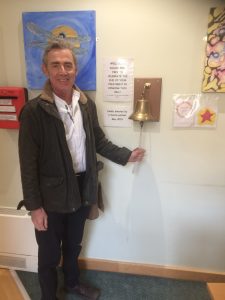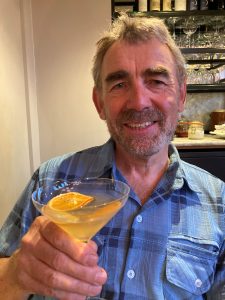In the summer of 2020, Mark Loveys was enjoying a peaceful evening with his wife. As he got up from the sofa, he casually rubbed the side of his neck and felt a lump under his right ear. It was about the size of a walnut, but Mark had been experiencing a bit of toothache at the time and put it down to that.
However, a week or two later, the lump hadn’t reduced or gone away so he made an appointment with his GP to get it checked. Mark was referred to a local specialist and then quickly on to the ENT department at Poole Hospital, who arranged for a biopsy to be taken.
The results revealed it was a squamous cell carcinoma in the lymph node, a type of neck cancer.
Mark Loveys,Cancer is such a loaded word, if I had to mention it, I just called it ‘my tumour’.
“It was a shock,” Mark said. “I could barely bring myself to utter the word to begin with. Your mind starts racing and it is a worrying time. But I was very reassured by the medical team. I was told it was very treatable, curable and that I shouldn’t panic.
“Naturally I had to tell my grown-up children, which was difficult. Due to Covid restrictions at the time, I couldn’t meet with them face to face since they both live a way away from home, however this helped me to plan how to break the news. My son works in a hospital lab so, I thought, would take it more in his stride, whereas my daughter has always had a fear of her parents dying since she was little. I think that being totally up front can be a bit brutal and is not always the best policy, so to minimise the shock I drip-fed the info to them over the telephone and by texts over a period of a week or two as I found out more about my prognosis from the hospital. They both coped well with the news and were incredibly supportive throughout the whole experience.”

Mark, who is a former primary school headteacher, was referred for a CT scan and then an MRI which found a mass on his tonsil, which was probably where the lump in his neck originated. Thankfully, the cancer hadn’t spread beyond the lymph node, and it was classified as a t1, n1, m0 tumour, caused by the Human Papilloma Virus (HPV). Mark was reassured that this type of cancer was very treatable.
Mark had surgery to remove the lymph nodes in his neck along with the tonsil a few weeks later, which was then followed by a course of chemotherapy and radiotherapy to ensure that all the cancer cells were gone. All went well and Mark’s recovery, although prolonged, was relatively straight forward.
Mark was under the care of Dr Emma King, Professor of Head and Neck Surgical Oncology at the University of Southampton and one of the co-investigators for the HARE-40 trial. The trial is testing a new vaccine to prevent reoccurrence of cancer and Mark was asked if he wanted to take part.
Dr Emma King, Professor of Head and Neck Surgical OncologyWe are testing a new vaccine which is designed to help the immune system recognise and destroy these strains of the virus to help fight the cancer.
Dr King explained: “Head and neck cancers, like the type Mark had, are one of several cancers that are caused by HPV. HPV is extremely common, and in many cases the body will deal with the infection with no lasting effects. But some strains of HPV can lead to cancer. With the HARE-40 trial we are testing a new vaccine which is designed to help the immune system recognise and destroy these strains of the virus to help fight the cancer.”
The trial is being run by the Southampton Clinical Trials Unit, which is based at the University’s Centre for Cancer Immunology, the expert team at the NIHR Clinical Research Facility (CRF) at University Hospital Southampton, and the Cancer Research UK research nursing team who administer the first-in-human vaccine to participants.
Mark said: “I’d be lying if I said that the possibility of reoccurrence hadn’t crossed my mind. I imagine that anyone who has had cancer will worry about it coming back. But this trial was an opportunity to increase the chances of it not returning and I was pleased to be able to help the medics who had looked after me so well.”

Starting in the autumn of 2022 and going into the new year, Mark received eight doses of the vaccine overall, four weekly vaccinations and then four fortnightly vaccinations with each dose stronger than the last. He is now going for regular follow up appointments so our researchers can assess whether the vaccine leads to an increase in immune cells and any change in the participants’ cancer.
“I had a few reactions to the vaccine,” Mark explained. “Some shivering and low blood pressure, but the team were fantastic. They watched me like hawks and changed the dosage accordingly. Being part of the trial has been a really interesting and positive experience. I know that I’m still here because of people who have taken part in clinical trials in the past, so I wanted to take part and do my bit. I hope people see this and want to take part in clinical trials to aid progress in treatment – they’re just so important.”